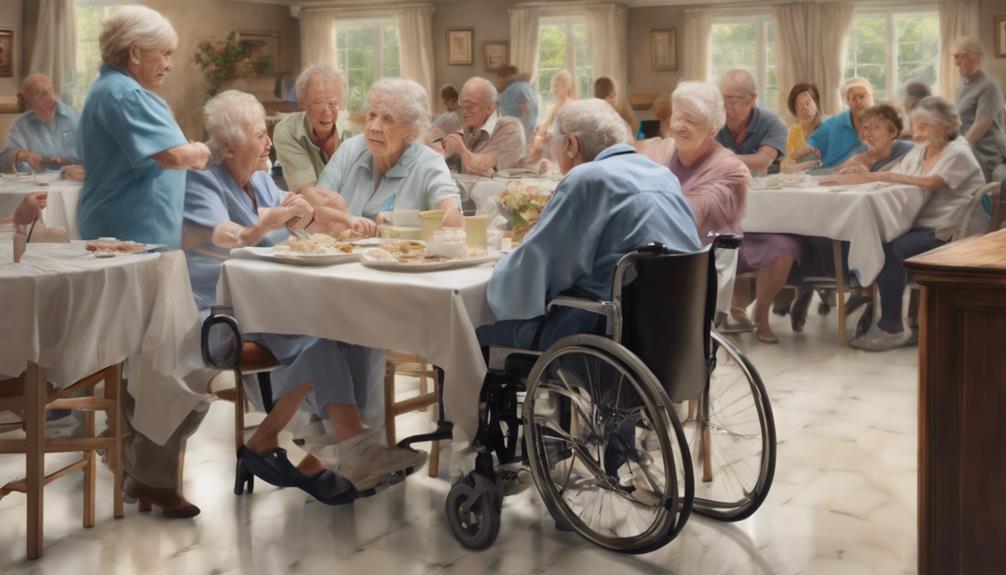Supporting a loved one with dementia requires careful navigation as each interaction holds significant weight. Our approach and ability to connect with them directly impacts their daily experiences and our relationship with them.
By understanding their unique needs and behaviors, we lay the foundation for meaningful experiences that transcend memory loss. But how do we navigate this challenging terrain with grace and compassion, ensuring that each moment is filled with love and understanding?
Let's explore the art of creating lasting memories and fostering strong emotional bonds with our loved ones on this dementia journey.
Key Takeaways
- Emotional connections enhance care quality.
- Engage in activities tapping into old memories.
- Use simple, clear communication for comprehension.
- Create a supportive, familiar environment for comfort.
Understanding Dementia Behavior Patterns
Understanding the intricate behavior patterns associated with dementia can be both challenging and enlightening for caregivers and loved ones alike. Memory loss is a hallmark of dementia, which progresses through different stages, impacting behavior in various ways. In the early stages, memory loss may be subtle, with occasional forgetfulness and difficulty recalling recent events. As dementia advances, memory loss becomes more pronounced, affecting not only short-term but also long-term memories. This progression can lead to disorientation, where individuals may struggle to recognize familiar faces or places.
Navigating the stages of dementia requires patience and understanding. As memory loss worsens, individuals may exhibit agitation, aggression, or engage in aimless wandering. Communication difficulties can arise from disjointed sentences and cognitive impairments, making it challenging to connect with loved ones. Despite these challenges, caregivers may experience occasional moments of connection with dementia patients, fostering understanding and compassion. It's essential to approach each interaction with empathy and adapt communication strategies to suit the individual's needs. Through patience and support, caregivers can help individuals with dementia navigate their changing behavior patterns with dignity and respect.
Building Emotional Connections

Navigating the challenges of dementia behavior patterns illuminates the significance of building emotional connections with our loved ones facing this condition. In the realm of dementia, where verbal communication may falter, emotional connections act as bridges that link us to our loved ones. It's through empathy, patience, and a willingness to understand that we can forge these vital connections.
By showing unwavering support and love, we not only strengthen our relationships but also enhance the quality of life for both the individual with dementia and ourselves as caregivers. These emotional bonds form the foundation for creating lasting and positive memories with our loved ones.
Prioritizing emotional connections over verbal exchanges enables us to engage in meaningful interactions that transcend language barriers and cognitive limitations. In the realm of dementia care, building emotional connections isn't just a choice but a necessity that fosters a sense of belonging, security, and love for our loved ones with dementia.
Engaging in Meaningful Activities
Engaging in activities that hold personal significance can greatly enhance the well-being and connection with our loved ones who've dementia. Alzheimer's disease can make it challenging for individuals to retain recent memories, but old memories often remain intact. By engaging in activities that tap into these old memories, we can create meaningful experiences for our loved ones.
Simple activities like looking through old photo albums or baking family recipes can evoke joyful memories and spark moments of connection. These memory-evoking activities have the power to trigger positive emotions and create a sense of familiarity and comfort for individuals with dementia.
When we engage in activities that have personal meaning to our loved ones, we not only provide them with moments of joy but also strengthen our emotional bond with them. These activities can serve as a bridge to the past, allowing us to share in cherished memories and experiences together. Through these meaningful interactions, we can create lasting memories that bring happiness and connection to both our loved ones and ourselves.
Effective Communication Techniques

In our interactions with loved ones who have dementia, employing effective communication techniques is crucial for fostering understanding and connection. When communicating with a person with dementia, it's important to use simple and clear language to enhance comprehension. Maintaining eye contact and speaking slowly can help the individual process information more effectively. Non-verbal communication through gestures, touch, and facial expressions also plays a significant role in conveying emotions and connecting on a deeper level. Active listening, which involves giving your full attention and validating the person's feelings and experiences, is key to building trust and rapport. Being patient, compassionate, and empathetic in your interactions can create a supportive environment that nurtures a sense of connection.
| Effective Communication Techniques |
|---|
| Use simple and clear language |
| Maintain eye contact and speak slowly |
| Encourage non-verbal communication |
| Practice active listening |
| Be patient, compassionate, and empathetic |
Creating a Supportive Environment
To provide comfort and stability for a loved one with dementia, creating a supportive environment involves minimizing distractions and establishing a calming atmosphere. It's crucial for family members to understand that individuals with any form of dementia thrive in familiar settings.
Utilizing familiar objects and routines can create a sense of security and comfort for them. Establishing a predictable daily schedule is also beneficial as it reduces confusion and anxiety. Safety is paramount, so removing hazards and incorporating memory aids like labels or color-coded items in their living space can prevent accidents.
Encouraging independence is empowering; setting up easy-to-use systems and supporting activities that promote a sense of accomplishment can boost their self-esteem. By prioritizing these elements in the environment, family members can help their loved ones with dementia feel more at ease and enhance their overall quality of life.
Frequently Asked Questions
When Should You Move Someone With Dementia to Assisted Living?
When should we move someone with dementia to assisted living?
It's crucial to assess their safety and daily functioning first. Signs like missing medications or struggling with personal care may indicate the need. We must also consider the caregiver's well-being, as constant care can be overwhelming.
Involving the person with dementia in the decision-making process is important, along with seeking advice from healthcare professionals and support groups to make an informed choice.
How to Tell a Loved One With Dementia They Are Going to a Nursing Home?
We gently explained the move to a nursing home, stressing the specialized care and safety available. Involving them in the decision-making process helped maintain a sense of control and understanding.
Reassurance and support were crucial, acknowledging their feelings and concerns throughout. Seeking guidance from healthcare professionals ensured a smooth transition. Our empathy and clear communication made the conversation more manageable for everyone involved.
How Do You Help a Loved One With Memory Loss?
Helping a loved one with memory loss involves creating a supportive environment. Encourage memory-evoking activities, use triggers like music or family heirlooms, and focus on person-centered care.
Involve family members in memory activities, such as looking at photos together or sharing personal thoughts. Home care services like Home Instead CAREGivers can provide specialized support for Alzheimer's care.
Conclusion
In conclusion, it's important to remember that individuals with dementia are still capable of forming meaningful connections and creating new memories.
One fascinating statistic to note is that engaging in memory-evoking activities can lead to a 50% increase in positive interactions with loved ones with dementia.
By approaching interactions with love, understanding, and patience, we can make lasting memories and strengthen our relationships despite the challenges of memory loss.
Let's continue to make memories, not enemies, with our loved ones with dementia.









